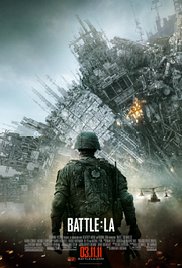 Whatever you might think of “Battle: Los Angeles,” you can bet that the US Marine Corp loves it, because it makes them look like the baddest motherfuckers on the planet. See the enemy, kill the enemy, die with your boots on. There’s something oddly refreshing about a war movie that makes no effort to humanize its characters. Pity the entire movie is made from the parts of a dozen other, better movies, and shot in a manner that suggests the cameraman is riding a pogo stick.
Whatever you might think of “Battle: Los Angeles,” you can bet that the US Marine Corp loves it, because it makes them look like the baddest motherfuckers on the planet. See the enemy, kill the enemy, die with your boots on. There’s something oddly refreshing about a war movie that makes no effort to humanize its characters. Pity the entire movie is made from the parts of a dozen other, better movies, and shot in a manner that suggests the cameraman is riding a pogo stick.
The movie takes place in the future (well, August of this year), where a series of meteor showers strike off the coasts of two dozen major cities around the world. The military quickly deduces that they were not meteors but in fact alien spacecraft, and moves in to evacuate the citizens of each city. In Los Angeles, a group of inexperienced Marines, aided by a recently retired Staff Sergeant with a spotty past (Aaron Eckhart), go on a mission to retrieve a group of civilians stranded at a police station within the radius of a massive blast scheduled to detonate in three hours. The Marines are jumped almost immediately, but as they get to know their enemy, they formulate a plan to bring the attack to the attackers.
Notice that there is not one character name in the plot summary. That is because the people in this movie do not matter in the slightest, with the exception of Hector, a boy whose father (Michael Pena) commits an extraordinary act of courage. Everyone else is defined by either their special skill (veterinarian, tech expert) or personal baggage (one Marine lost his brother under Eckhart’s watch on an earlier mission, one has a baby on the way, one wants to be a doctor). Roland Emmerich’s trilogy of “Destroy LA” movies (“Independence Day,” “The Day After Tomorrow” and “2012”) look like Mike Leigh-esque character studies by comparison.
For a movie about a group of soldiers in the so-called heart of darkness, “Battle: Los Angeles” is not terribly visceral. There is one exception to this, and that is the scene where Eckhart takes an injured alien and ruthlessly pokes and prods it until he finds its weak spot. It’s as war-like as the movie gets; everything else is behind-enemy-lines chaos, glassy-eyed reaction shots and that damn shaky cam nonsense.
There isn’t anything in “Battle: Los Angeles” that hasn’t been done before, and while that’s not always a death sentence (“The Town” and “RED” both rose above their familiar premises), you still have to give the audience something to latch on to, be it drama, disaster sequences, cool CGI, or pithy one-liners. “Battle” has none of those things. It has carnage, but that isn’t enough; you have to make people care about the carnage, and there is little here worth caring about.
 (2 / 5)
(2 / 5)



